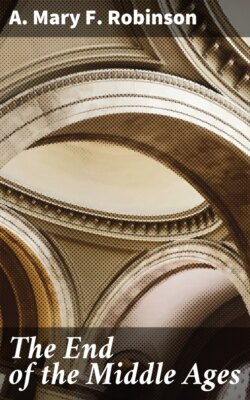Читать книгу The End of the Middle Ages - A. Mary F. Robinson - Страница 11
На сайте Литреса книга снята с продажи.
VIII.
ОглавлениеTable of Contents
In the year 1328 nearly fifty Libertines or Brothers of the Free Spirit were publicly burned at Cologne.
The persecution of the wandering Beguines and Beghards had thoroughly begun. In the history of the time, in the chronicles of any town along the Rhine or in the Low Countries, we may meet the dolorous little entry: On such a day so many Beghards were burned or imprisoned in perpetual In pace. A special German Inquisition was instituted against them.
It is the old cruel war of intolerance and heresy, the vain and shameful struggle with which six centuries are full. But there was here a more than usual excuse for the excessive severity of Rome. Europe was fast being ruined by these mendicant wanderers. Begging friars of St. Francis, Carmelites, Dominicans, numerous new orders which flourished for a while, and died, and are forgotten, all these flooded the country with pious vagrants for whom the impoverished laymen must provide. And in addition to all these orthodox idlers, there was now a countless horde of wandering Beghards, no less ignorant, no less incapable of warfare or of labour, and, in addition, pestilent heretics. Such was the view of the Church.
Fifty years before, Gregory X. had tried to reduce “the unbridled throng of mendicants, who are a heavy burden alike on Church and people;” but his efforts had been in vain. The poor of every nation and of every time are quick to ascribe piety to those who, ragged and homeless, assert that the life to come shall repay them for their sufferings here. Half starved, down-trodden, little better than slaves, the peasants of Germany would share their squalid meal thankfully with the wandering friar. It was little less than sacrilege to refuse a portion to the holy man. This was the natural attitude of the people. They gave, and did not complain.
They gave, and the friars took, and the Beghards took, and still the cry was “Give.” The Fratricelli, Apostolici, Beghards, Beguines, Brothers of the Free Spirit, overran the whole of Europe. These all must be fed no less than the orthodox fraternities. And year by year the number of the mendicants increased. The careless wandering life without responsibility or consequence, the absence of ties or of toil, the prestige in idleness, attracted the vagabond and lazy. And many of the pious really believed it the noblest human life. Since the idea of Divinity was simplicity, mere simplicity, then the more the saint was simplified and the less heed he took for apparel or for food the nearer he was to heaven. These men and women, strange descendants of the spinning sisters and the Fratres Textores, were like the lilies of the field inasmuch as they toiled not, neither did they spin. They thus fulfilled the popular ideal of piety. Year by year labour and forethought grew more discredited, as it was discovered that, if you did not feed yourself, a more worldly person would always feed you; until in 1317 we read in the sentences collected by Johann von Ochsenstein that no exterior motive, not even the desire of the kingdom of heaven, should tempt a good man towards activity.
It was in vain for even the Pope to preach, for Guillaume de St. Amour to attack all mendicants alike, for councils and bishops to thunder against the indolence, the mendicancy, the lax morals and loose opinions of these men. The mendicants grew more and more. The nations groaned under the holy burden. Then, about 1310, unable to contain her displeasure any longer, the Church bursts forth into interdicts and persecution. Fifty Beghards are burned at Cologne. At Magdeburg some Beguines are cast into prison. At Strasburg, at Constance, at Mayence, the Beguines and Beghards are punished unless converted within three days. It is war to the knife against the wandering heretics.
